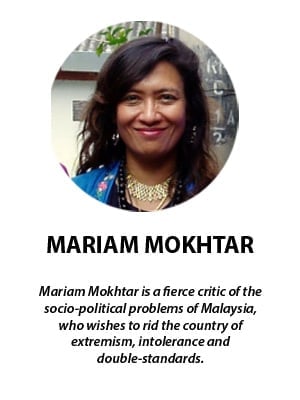
Zambry Abdul Kadir, the higher education minister, has selective amnesia.
Foreigners with dissenting views, or those who ask too many questions, or academics who encourage freedom of thought and intelligent discourse, will face the wrath of the authorities.
In the past, many were met at KLIA by the police or the religious police. Their exit from the country was not altogether smooth, because in many cases, they were interrogated or detained or both.
In September, 2017, the American-based Turk, Mustafa Akyol, a renowned journalist and Islamic scholar, was invited to give a series of talks in Malaysia about his latest book at the time, “The Islamic Jesus: How the King of the Jews Became a Prophet of the Muslims.”
Although some progressive Muslim NGOs would like to encourage public discourse and challenge many outdated ideas, the Malaysian authorities disagree.
Our religious leaders are afraid of Malays who are able to think critically, analyse facts and discuss ideas. A person with an open mind will not get into a religious frenzy, or think that a differing point of view is a personal slight.
For his first lecture, Akyol said that Muslims were haunted by “intellectual suicide”, and for his second, he challenged the country’s methods of dealing with apostasy. He disagreed with moral policing and the rehabilitation of Malays who wanted to leave Islam. Akyol reiterated the fact that there was no compulsion in religion.
When it became clear that his talk was too controversial, his hosts advised Akyol to leave, but at KLIA he was detained and interrogated.
If it could have happened to a respected Turkish-Muslim scholar, what makes Zambry think that Bruce Gilley, the American professor of political science, would not suffer the same fate?
So much for Zambry’s assertion that Gilley had nothing to fear.
Earlier this year, FMT reported that the political scientist, Ahmet T Kuru, had been approached by plainclothes policemen at KLIA, but successfully thwarted their attempts to snatch his passport.
He too had been invited to give a talk in KL about his latest book, but after his host, Ahmad Farouk Musa, the founder and director of Islamic Renaissance Front, had been questioned by the police, Kuru agreed with Ahmad Farouk’s suggestion that he leave the country rather than risk arrest. They feared the worst.
Malaysians know their country best, so, had Ahmad Farouk not warned him, would Kuru have been arrested, especially as the authorities had labelled him as a terrorist?
Was Zambry not aware that these academics had feared for their safety? Will he appreciate that Gilley’s fears are not unfounded?
Critical thinking, especially if it is about religion, is actively discouraged by the authorities.
In January, the two Malaysian film makers responsible for the production of the film Mentega Terbang were charged in court for deliberately “wounding the religious feelings of others”.
Conservative Muslim groups disagreed with some scenes which they found objectionable to the Islamic teachings in the country. Instead of allowing public discourse, the government took the easy way out and banned the film.
Likewise, anyone with opposing views – and this includes lecturers with pro-Israeli views which counter the prime minister, Anwar Ibrahim’s pro-Hamas views – will find their services terminated, and their products banned.
In 2011, French lawyer William Bourdon, and Imran Khan, a British lawyer, were deported after entering Malaysia for talks on Scorpene and the Hindraf suit, respectively.
In 2014, Indonesian Muslim scholar, Ulil Abshar Abdalla, was denied entry into Malaysia, whilst in January 2016, another Indonesian, human rights activist Mugiyanto Sipin was deported.
In 2016, two Australian journalists were arrested and then deported for reporting on 1MDB.
These people were merely doing their jobs. The lecturers were opening minds and encouraging discussion. The film makers were addressing sensitive issues via their creativity. The journalists wanted to present the facts to the world.
The politicians’ and religious leaders felt threatened because opening the minds of people would encourage people to think and analyse the facts. They had to be silenced and that is why these people felt that their safety was at risk.
Will Zambry accept that discussion is the latest intolerance in Malaysia? - FMT
The views expressed are those of the writer and do not necessarily reflect those of MMKtT.



No comments:
Post a Comment
Note: Only a member of this blog may post a comment.